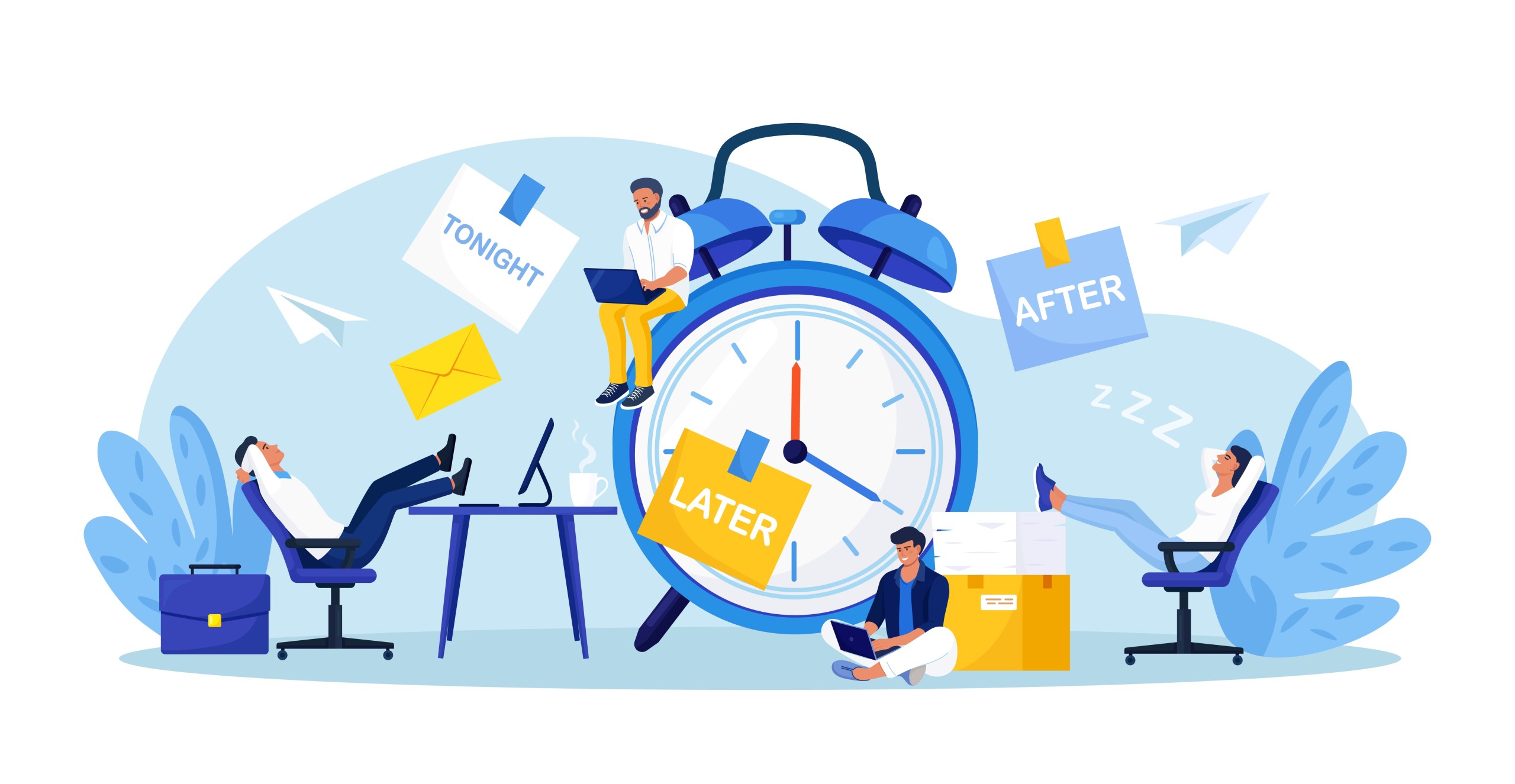
Have you ever sat down to write a paper, start a math problem, or respond to a text exchange and got a surge of stress, discomfort, or dread? Have you then found yourself getting rid of those uncomfortable emotions by scrolling on your phone, getting a snack, or finding something more pleasant on your “to-do” list to accomplish? If so, you have likely struggled with procrastination.
Procrastination is when you put off an undesirable task in favor of doing something else. Procrastination is one of the most normal behaviors we do – who wouldn’t rather watch another funny TikTok than start homework?!
For some people, procrastination is a time management and organization issue; however, for many of us, procrastination is actually an emotion management issue. We often try to put off tasks that create uncomfortable emotions such as anxiety, boredom, and confusion. To overcome procrastination, it is important to identify:
- Why you procrastinate
- Your cycle of procrastination
- Some useful tools to get back on track
Understanding Why you Procrastinate
Our brains are threat detecting machines, which can be lifesaving when you are hiking and run into a bear. When we face a threat, our brains activate our threat response system, known as the amygdala. This threat response system engages our body and mind to get rid of a threat by hiding, running, or fighting. Unfortunately, our brains create the same response whether that threat is a bear or a final exam. For a bear run-in, our brain’s response is very helpful; for a final exam, not so much.
In many ways, our brains are wired to procrastinate. When we encounter a task that brings up uncomfortable emotions, our brain tries to cope by “getting rid” of the thing that is causing that emotion. Procrastination, therefore, temporarily “gets rid” of the uncomfortable emotion by delaying the stressful task. When we temporarily “get rid” of anxiety and do something else, our brain feels rewarded and relieved. That is often why we keep procrastinating (because of the reward).
Identifying Your Cycle of Procrastination
Procrastination often feels like an emotional roller coaster – you may feel a pang of anxiety, then temporary relief, then guilt, then a pang of anxiety, then relief again. While procrastination may feel chaotic, the cycle of procrastination is actually very predictable. When you identify your procrastination triggers, you can learn different strategies to overcome them.
To start to identify your cycle of procrastination, think of a task you have been putting off. Jot down all the negative thoughts that your mind tells you about this task such as, “You’re going to fail.” “This is too hard.” “I’m so bored.” etc.
Second, notice what feelings come up in your body as you think about the task and write these down. For example, stress, guilt, tiredness, jittery, unmotivated, etc.
Third, write down all the activities you do to avoid these thoughts and feelings, such as scroll on your phone, play video games, read the news, etc.
Beware! Procrastination is a trickster. Your brain might convince you to engage in procrastination activities that are “productive,” like cleaning or focusing on another assignment. However, this behavior is also part of the procrastination cycle. We are often doing these other tasks to delay doing the dreaded task.
Learn Some Useful Tools to Get Back on Track
Now that you have identified your thoughts, emotions, and actions that perpetuate your cycle of procrastination, you can target your cycle of procrastination by trying some of the strategies below:
- Assign yourself time to procrastinate
One of the main emotions that keeps the procrastination cycle going is guilt. We feel terrible when we have wasted time (again!) and procrastinated. However, guilt often leads to more negative thoughts and feelings and, therefore, more procrastination. If guilt drives your procrastination cycle, your mind might tell you thoughts like “well, it’s useless I’ve already wasted hours watching TV, the day is ruined, might as well finish this series…”
To better manage guilt and shame, schedule time to procrastinate. It’s normal and natural to need a break from studying or to do something calming before we start a difficult task. By assigning ourselves procrastination time, we can remove guilt and shame. Plus, scheduled procrastination time isn’t procrastination, it’s self-care!
2. Give yourself compassion rather than criticism
Negative thoughts about your abilities, self-control, and focus can trigger a cycle of procrastination. Instead of talking negatively about yourself if you have the urge to procrastinate, try talking to yourself like you would talk to a friend.
To do this, first notice the negative thoughts and feelings you are experiencing when you get the urge to procrastinate.
Next, normalize these thoughts and feelings. To do this you might try saying “who wouldn’t” statements like, “Who wouldn’t get overwhelmed when they need to study for a final exam?” or “Who wouldn’t feel unmotivated to study for the next three hours?” These “who wouldn’t” statements can help us grow compassion for ourselves by normalizing our experience.
Last, talk to yourself like you would talk to a friend. Try to be authentic, realistic, and kind. You might say statements such as, “You’re overwhelmed and that’s ok. This is an overwhelming task. Let’s start with just the first step and see how that goes,” or “This doesn’t have to be perfect, it just has to be done. You can make it better later.”
3. Don’t wait to be motivated
Let’s face it. You are never going to feel motivated to do that dreaded math homework. Waiting for motivation to strike is a little like waiting for the weather to be perfect before leaving your house to go meet your friends. Sometimes, you just need to take an umbrella and go.
Starting a task, even when you don’t feel motivated to do it, can lead to motivation later. Once you get the ball rolling and have some momentum, you might even start to feel motivated.
4. Try making the worst rough draft
There is nothing more discouraging than staring at a blank page knowing you have a whole essay to write. For some of us, perfectionism and trying to get every word right the first time can get in the way of getting something done. If perfectionism is part of your procrastination cycle, try to intentionally make a bad rough draft.
To make the worst rough draft you may even start by writing whatever your mind tells you in the moment. Here is an example:
The title is going to go here, but I don’t know it yet
Procrastination is (look up definition). The cycle of procrastination is predictable and blah blah. To avoid procrastinating try these 5 steps.
Remember, it is always easier to correct, than to create. So, after you are done with your rough draft, walk away from it and read it later. You might be surprised that it’s not as bad as you think.
5. Get an accountability buddy
If there is any takeaway from this post, let it be that everyone procrastinates. Luckily, this means that all of your friends procrastinate too and they also might need some help staying on task from time to time. To help manage procrastination, ask a friend to be an accountability buddy. You might tell a friend that you are going to work on your history project for 30 minutes and then report back to them one interesting fact. A little peer pressure can help us accomplish small, achievable goals.
Elizabeth Neri, MPH, LCSW, Licensed Clinical Social Worker, Anxiety Specialists of Atlanta. Ms. Neri worked at university counseling centers for over 8 years helping students overcome procrastination and other mental health struggles that can get in the way of academic achievement. Ms. Neri specializes in using experiential and mindfulness-based approaches in therapy and draws predominantly from Acceptance and Commitment Therapy, trauma-informed approaches, social justice frameworks, systems theory, and attachment-based models.

